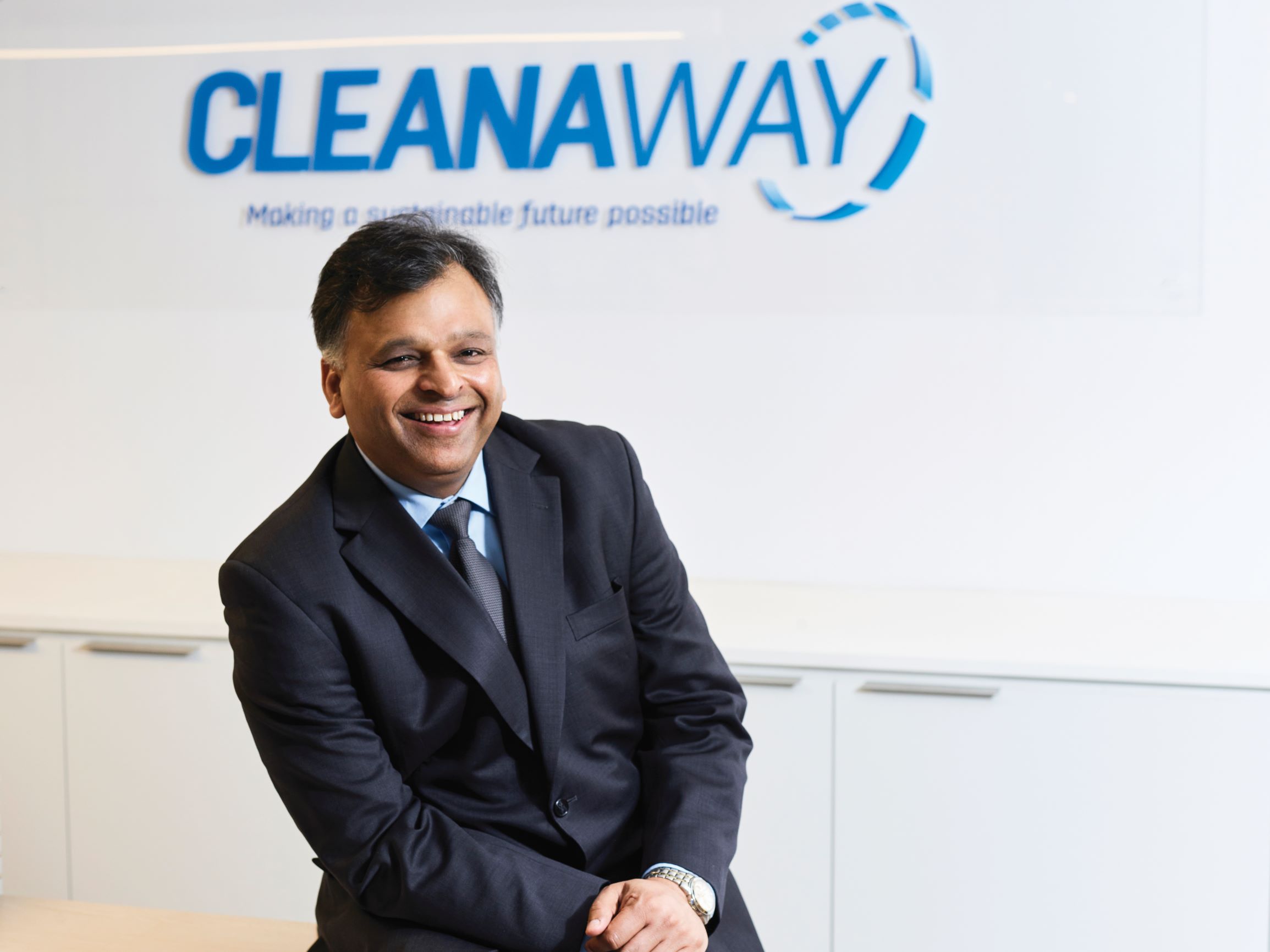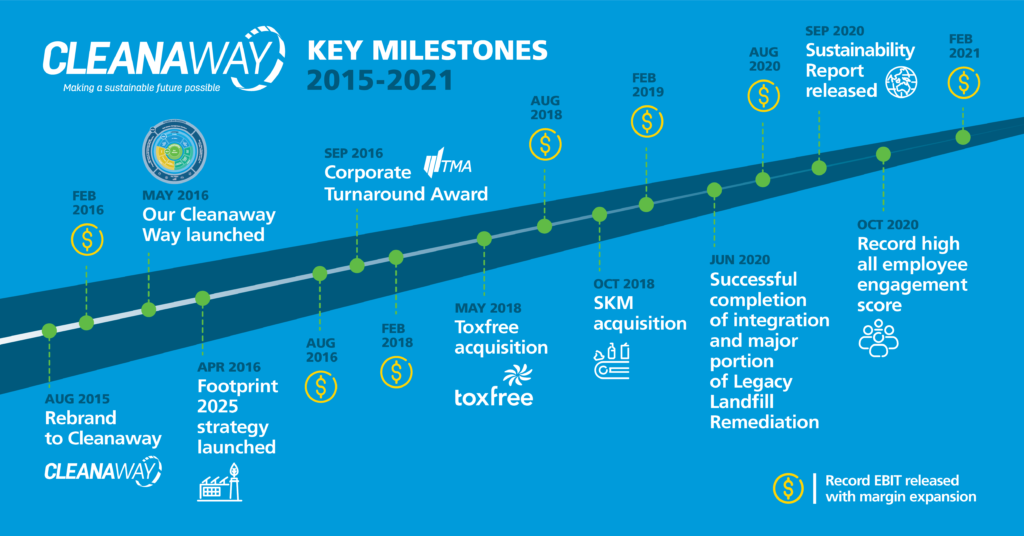The time is now for Australia to build a circular economy and with the right investments and partnerships that help deliver sustainable outcomes for recycled materials in Australia.
The time is now for Australia to build a circular economy and with the right investments and partnerships that help deliver sustainable outcomes for recycled materials in Australia.
Early in 2020 as many eastern states were still battling bushfires and governments were setting up COVID-19 lockdown plans, CEO and Managing Director Vik Bansal was clear about Cleanaway’s three priorities for working through the situation, and what our teams should be focusing on:
“Firstly, it was paramount that we protect our employees and keep them safe as many would continue to work on the front-line delivering essential services. It was also clear we had to maintain our collection services and processing operations to ensure our communities could keep functioning despite the lockdowns. The third priority was the sustainability of our business – to keep our people employed and provide that security for those that relied on us.”

Pictured: Cleanaway CEO and Managing Director Vik Bansal
2020 and the COVID-19 pandemic turned out to have far greater impact than we expected but by working together Cleanaway enters 2021 as resilient as ever – delivering value for customers and communities and investors through a strong bottom line, expanding resource recovery capabilities and continuing to provide our essential waste management services.
But Cleanaway wasn’t always the leading waste management solutions provider it is today.
When Vik arrived as CEO in July 2015, Cleanaway, then known as Transpacific (and Brambles before that) was struggling to recover under a debt burden of around $2.1 billion and a lack of strategic direction, despite management’s best attempts.

Vik set about turning around the business by refreshing the brand, focussing on a consistent approach to customer service, and improving capital discipline. By 2016, Cleanaway Waste Management was born with a mission to ‘make a sustainable future possible’, revenue and earnings were showing growth for the first time in three years and a medium to long term strategy was clearly articulated. The markets and industry started taking notice, and Cleanaway was awarded the Turnaround Management Association’s (TMA) Turnaround of the Year Award, in the large company category in the same year.
“The focus was on re-setting the business for success with a clearly-defined strategy and an achievable action plan. It was also about accelerating and re-focussing our growth initiatives and customer service and ensuring clear accountabilities for our senior leadership to enable improved performance.” said Vik.
With a clear direction set for the business, it was time to look inwards. We launched Our Cleanaway Way, a strategy on a page that articulated a unified set of values to guide priorities and decision making, and outline what we could expect of each other. Our Cleanaway Way aligned our people towards a single mission and gave us a vision in our journey to take the company from “good to great”.
In 2017, Cleanaway launched our Footprint 2025 roadmap to ensure Australia has the right infrastructure in place to support communities in managing their waste, while continuing to improve resource recovery.
“Growing populations and increased waste generation meant we had to look at long-term and sustainable solutions to recover more from waste and process more recyclables to ensure that the least amount of residual waste is left to be disposed of.” said Vik.
“We set about ramping our capabilities through greenfield investments and strategic acquisitions. The successful integration of Toxfree and Daniels Health truly cemented Cleanaway’s position as a total waste services provider in Australia with an unrivalled footprint of more than 6,000 people and over 5,300 vehicles, operating from over 250 sites around the country.”
In 2019 when the former SKM Recycling went into administration, Victoria lost half its recycling capacity. Vik and the leadership team were able to see the potential of the assets, including material recovery facilities, a plastic recovery facility and transfer stations. Following a public process, Cleanaway acquired SKM assets in Victoria and Tasmania, and restored recycling to Victorian councils.
“The recycling sector is undergoing significant structural changes with a move to increase recycling within Australia to support a transition towards a circular economy. The Acquisition provides us with the infrastructure to capitalise on the growth opportunities created by these changes.” Vik explained at the time.
With our mission, “To make a sustainable future possible” firmly in mind, in 2019 Vik told the market that Cleanaway would publish a comprehensive Sustainability Report. Launched in 2020, the report lays out a set of material topics and nine of the UN Sustainable Development Goals that we believe we can make the greatest impact on.
Today and into the future, Cleanaway has our sights firmly set on extending our capabilities further up the waste value chain. Our partnership with Pact Group and Asahi to build a plastic palletising facility in Albury to recycle the equivalent of 1 billion 600ml PET plastic bottles each year into new food and beverage packaging demonstrates how Cleanaway is contributing to the development of the circular economy in Australia.
Recent grants by the State and Federal Governments will enable Cleanaway to continue investing in glass beneficiation, as well as plastic pelletising in Victoria, enabling a closed loop solution for glass and plastics.
“The time is now for Australia to build a circular economy and with the right investments and partnerships that help deliver sustainable outcomes for recycled materials in Australia. We hope to see a sophisticated recycling economy in Australia, driven by technologies such as energy-from-waste, strong industry-government partnerships and a commitment to and from all Australians to make a sustainable future possible.” said Vik.
Contact us to learn more about how we are making a sustainable future possible for communities and businesses across Australia.